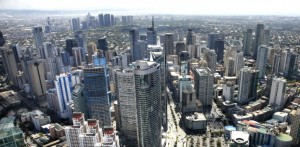
MANILA — The Philippines has gone a long way in attracting foreign direct investments (FDIs) with the 2013 expansion posted at 24 percent year-on-year.
Data released by the United Nations Conference on Trade and Development (UNCTAD) Tuesday showed that total FDI inflows to the country last year amounted to USD 3.86 billion, higher than the USD 1.07 billion inflows in 2010 and the USD 2.43 billion average from 2005-07.
However, this remains minute compared to its neighboring countries partly because of constitutional restrictions on foreign ownership.
Former National Economic and Development Authority (NEDA) Director General Cielito F. Habito, who serves as the Chief of Party of the Trade-Related Assistance for Development (TRADE) Project, said this restriction is among the reasons impeding the faster growth of FDIs to a country.
”So this is the reason why I believe it’s really time to revisit our age-old resistance to opening up because we are one of the few, especially in the ASEAN, that are quite restrictive on this,” he said during the launch of the World Investment Report 2014.
Since the change in the foreign ownership rule seems to be a long-shot Habito said the government should instead consider some changes in the definition of the term public utilities, where foreign investors’ ownership are restricted.
He explained that technology and the realities of current time made some of the definition of public utilities out-dated thus the need to “be more liberalized in terms of the country’s restrictions in the past.”
In 2013, share of FDIs to gross domestic capital formation rose by 11.7 percent, higher than the 10.6 percent in the previous year.
Investments in fixed capital formation was boosted by public construction, which rose by 21.6 percent followed by investments in intellectual property products, 15.4 percent; durable equipment, 14.4 percent and private construction, 7.9 percent.
Habito said this growth could further improve if the government addresses issues on high cost of power, infrastructure inadequacies, cumbersome trade transaction processes, and government hurdles even at the local government unit (LGU) level.
He said emerging markets like the Philippines are the main recipients of FDIs account for 54 percent of the USD 1.45 trillion total FDIs globally.
Last year, developing countries attracted a record-high FDI inflows amounting to USD 778 billion, higher than the USD 566 billion that went to the developed countries and the USD 108 billion that went to transition economies.
For 2014, global FDI inflows is projected to further increase to USD 1.6 trillion while it is forecast to reach USD 1.8 trillion in 2015.
Habito explained that while emerging and developing countries benefit from this development, the smaller economies are finding it hard to cope up, thus, several modes of investment patterns have been introduced and these are trans pacific partnership (TPP), transatlantic trade and investment partnership (TIIP) and regional comprehensive economic partnership (RCEP).
He said the government is committed to plug the loopholes by putting in more infrastructure to encourage more foreign investors to place their money in the Philippines.
While Habito bats for some changes in the foreign ownership rule in the country, he does not consider this materializing in the near term especially since President Benigno Aquino III has publicly expressly his disapproval for this move.
Also, University of the Philippines (UP) Professor Leonor Briones, during the same event, said any move to change the Constitution will not be easy since people will always doubt the motives towards this goal.
The former National Treasurer of the country and the lead convenor of the Social Watch Philippines also said Congress more than enough constitutional issues to tackle including the Comprehensive Agreement on the Bangsamoro.
She also pointed out that changes in the foreign ownership rule is not the only way to encourage more foreign direct investments because some foreigners who are placing their funds in the Philippines are not into financing of the business per se but financing the technology-side of the business.